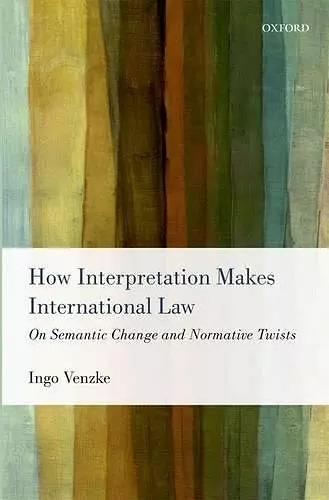How Interpretation Makes International Law
On Semantic Change and Normative Twists
Format:Hardback
Publisher:Oxford University Press
Published:6th Sep '12
Currently unavailable, and unfortunately no date known when it will be back
This hardback is available in another edition too:
- Paperback£51.00was £51.00(9780198712978)

Winner of the 2014 European Society of International Law Book Prize
An account of how the practice of interpretation makes international law, drawing specific attention to the increasing authority of international courts and institutions, this book analyses the role that the language plays in shaping international law. It addresses the key issue of how it contributes to the evolution of international norms.Challenging the classic narrative that sovereign states make the law that constrains them, this book argues that treaties and other sources of international law form only the starting point of legal authority. Interpretation can shift the meaning of texts and, in its own way, make law. In the practice of interpretation actors debate the meaning of the written and customary laws, and so contribute to the making of new law. In such cases it is the actor's semantic authority that is key - the capacity for their interpretation to be accepted and become established as new reference points for legal discourse. The book identifies the practice of interpretation as a significant space for international lawmaking, using the key examples of the UN High Commissioner for Refugees and the Appellate Body of the WTO to show how international institutions are able to shape and develop their constituent instruments by adding layers of interpretation, and moving the terms of discourse. The book applies developments in linguistics to the practice of international legal interpretation, building on semantic pragmatism to overcome traditional explanations of lawmaking and to offer a fresh account of how the practice of interpretation makes international law. It discusses the normative implications that arise from viewing interpretation in this light, and the implications that the importance of semantic changes has for understanding the development of international law. The book tests the potential of international law and its doctrine to respond to semantic change, and ultimately ponders how semantic authority can be justified democratically in a normative pluriverse.
It is an impressive and thought-provoking book for scholars and practitioners alike, as it addresses key issues of interpretation in a way that, until now, has remained more or less unexplored ... Readers of Venzke's book will find it the work of a talented writer and lawyer - a truly enjoyable read, and this being backed by solid research and well-structured arguments, the whole is a brilliantly executed piece of work. Last not least, Venzke also succeeds in building a bridge between legal theory and what is sometimes too pedestrian - the practitioner's perspective; both kinds of reader can benefit from reading this book. * Cristina Hoss, Heidelberg Journal of International Law *
Venzke's philosophically and dogmatically thoughtful work provides a sophisticated translation of critical linguistic arguments into concrete conclusions for the law. * Chris Thomale, Archives for Philosophy of Law and Social Philosophy *
Who does not read it [the book] will spend a lot of time with unnecessary problems. * Ralph Christensen, Juristenzeitung *
Ingo Venzke's insightful work on the changing of international norms by way of interpretation comes at an opportune moment ... Its main achievement lies in its critical approach to exposing where authority and power really lie. * Irina Buga, British Yearbook of International Law *
well worth reading ... a welcome contribution to international law * Jan Klabbers, European Journal of International Law *
Ingo Venzke's book How Interpretation Makes International Law: On Semantic Change and Normative Twists tells a number of tortoise and hare tales with respect to the creation of international law. In these tales the hare is represented by a number of different concepts and actors: formalism, states, sovereignty and sources-centred theoretical accounts of international law and the classic understanding of pacta sunt servanda as the ultimate maxim of how international law comes into existence ... the tortoises in Venzke's thesis are portrayed by the theory of communicative action, jurisgenerative practice and the interpretive acts of international administrations and other participants in international legal relations. Venzke's book is a significant step in providing a concrete theoretical framework for the analysis of how tortoises run. They run in many ways, but a very significant one is interpretation. * Maria Panezi, Transnational Legal Theory *
Readers of Venzke's book will find it the work of a talented writer and lawyer-a truly enjoyable read, and this being backed by solid research and well-structured arguments, the whole is a brilliantly executed piece of work. * Christina Hoss, Heidelberg Journal for International Law *
ISBN: 9780199657674
Dimensions: 235mm x 163mm x 25mm
Weight: 672g
338 pages